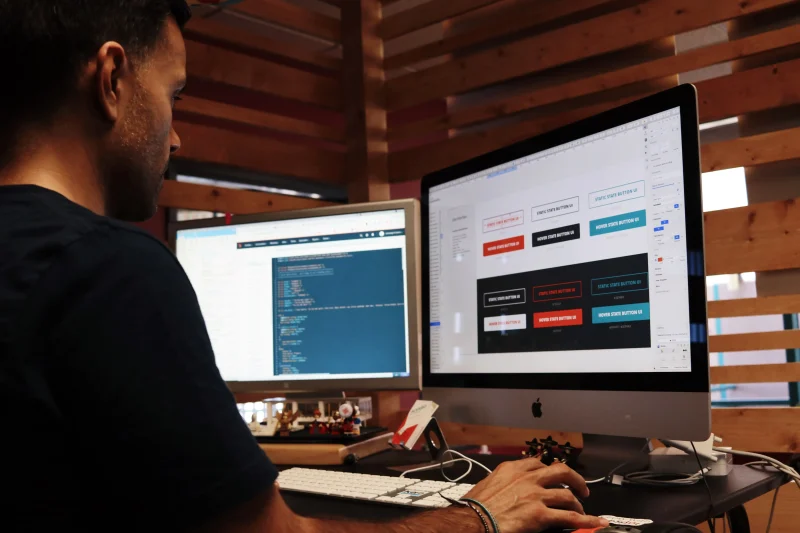Are you planning to become a web developer in Canada? Recent graduates may also have questions about the career path and salary package of a web developer in Canada. Here is a complete guide to web developer jobs for international students who are planning to study and work in Canada.
Table of Contents
What is Web Development?
Web development means the creation of websites and web applications for the internet through the design and development process. It includes a wide range of different areas, in which front-end and back-end development are two of the primary focuses within the field.
Front-end development focuses on user interface and user experience, which is known as UI/UX design, of a website. It pays more attention to visual elements such as font, colors, images, and the whole layout. Back-end development focuses on the server management of a website, including the management of the database, server, and APIs.
Web development is a promising career choice for those interested in technology and design. According to the Government of Canada’s Job Bank, there are projected to be 10,400 job opportunities for web designers and developers due to expansion and replacement demand between 2022 and 2031, with 12,700 new job seekers available to fill these positions from school leavers, immigration, and mobility. With the increasing demand for web developers, international students should consider pursuing a career in this field.

What Do Web Developers Do?
A web developer is responsible for creating and maintaining the website, including appealing visuals, user-friendliness, fitting the needs between the company and end-users, and regular updates. They use programming languages to design the website layouts and database architecture. Both front-end and back-end developers collaborate together to make sure the website runs smoothly.
How Many Programming Languages Should Web Developers Know?

There is no specific number and types of programming languages that a web developer should know. It depends on the roles and responsibilities of the developers.
Simply speaking, a web developer should be proficient in at least 2-3 programming languages in the web development field. HTML, CSS, or Javascript are some common and basic programming languages that a fresh-grad web developer should know. As you work longer, you may know and use other languages, such as Python, PHP, Ruby, Swift, or Java.
Moreover, web developers should also have a good understanding of the frameworks, libraries, and tools of web development. Some of the most popular and frequently used frameworks are React, Angular, jQuery, Vue.js, and Node.js.
At Create Career College, you will be able to learn various programming languages, including Python, Javascript, PHP, HTML, CSS, and React, in our Web Design and Development Diploma program.
What are the Skills Needed to Be a Web Developer?
Technical skills are essential for web developers to be successful in the web development field. As we mentioned above, web developers in different roles need to know different programming languages.
It is undoubtful that a qualified developer should have a solid understanding of different programming languages and technologies. Staying up-to-date with the latest trend and emerging technologies is also of the utmost importance as a web developer.
Apart from technical skills, website developers also need to have exceptional communication and team-working skills. It is because web developers have to understand the requirements and needs of the client or stakeholders from other departments.
What are the Different Types of Web Developers?
There are many different types of roles in the web development field. Each of them has specialized skills and responsibilities.
Front-end developers are responsible for creating interactive and user-friendly websites or web applications that users interact with.
Back-end developers have to build and maintain the server availability and security of web applications. The code they built is running behind the scenes while connecting the front-end elements with the back databases.
Full-stack developers mean they are proficient in both front-end and back-end development. Each full-stack developer can handle all aspects of web development, from the front user interface to the back server coding management.
Mobile developers create mobile applications for smartphones and tablets on iOS, Android, and other platforms. They use programming languages, software development kits (SDKs), and application programming interfaces (APIs) to develop optimized mobile applications to fit different platforms.
UI/UX developers work closely with UI/UX designers to implement user interface designs and user experience strategies. They have to ensure that the web application is intuitive, easy to use, visually appealing, and user-friendly. For detailed UI/UX designer career development knowledge, please read: How To Become A UI/UX Designer? Best Career & Salary Guide.

Is Web Development a Good Career?
Of course, web developer jobs are great careers nowadays. The career path for web developer jobs generally starts with a junior entry-level position, followed by mid-level and then senior roles. It is reasonable to expect when you have extensive experience in the web development field, you may get the chance to promote to the manager or lead developer position.
The promotion process varies by company and industry but is basically reviewed by skills, experience, performance, and leadership potential.
What Is the Salary of a Web Developer in Canada?
The employment environment for web developers in Canada is positive overall. The market demand for web developers keeps growing across different industries and roles, particularly for front-end, back-end, and UI/UX developers.
Moreover, the Canadian government put a strong emphasis on the technology sector as one of the key growth drivers and has implemented favourable policies to encourage growth. The policies include programs to support startups and innovation, as well as initiatives to attract and retain top tech talents in Canada.
That’s why the web development employment market is competitive and intense, especially in larger cities such as Toronto, Vancouver, and Montreal.
According to PayScale, a US software and data company that helps employees understand their worth in the job market, the average salary of an entry-level web developer is around C$55,000 per year in Canada. A mid-career position could earn around C$67,000 per year while a senior management role could get around C$ 78,000 a year.
Top Reasons Why Should You Become a Web Developer
Are you interested in technology and creating web applications? Create Career College’s web design and development diploma program can provide you with the skills and knowledge to turn your passion into a career.
Here are some of the reasons why you should find a web developer job:
- Growing demand
- High earning potential
- Flexibility and work-life balance
- Creative expression
- Diverse industry range
- Career growth opportunities

Web Developers Career: Conclusion
In conclusion, becoming a web developer in Canada is a rewarding career choice. After reading our guide to becoming a web developer, you should be able to understand what is web development, the responsibilities and skills of a web developer, as well as the career path and the salary scale of different web developers.
Successful candidates should have acquired a combination of technical skills and experience, as well as outstanding communication and problem-solving skills. And at Create Career College, students can learn the required technical skills in the lectures, and improve communication skills during projects and coursework.
Web Developers: FAQs
The time it takes to learn knowledge related to web development varies. Students can take months to years to complete the courses. For example, the completion time will be different on whether you are getting a bachelor’s degree, diploma, or certificate.
There are so many educational paths for you to become a web developer in Canada. You can pursue a bachelor’s degree in computer science, a diploma, or a certificate in web development. Studying at your own pace with self-study online courses is not a bad choice.
While having a degree can be helpful, it is not always necessary to become a web developer in Canada. Many developers are self-taught or have learned through other educational paths.
Yes, of course! Many web developers work as freelancers in Canada. This working style gives you more flexibility in terms of work schedule and project choice.
There are many online and offline resources available for starters to learn web development. For example, online courses, private tutorials, bootcamps, or even YouTube videos. Udemy, Codecademy, and FreeCodeCamp are some of the popular self-study options.




